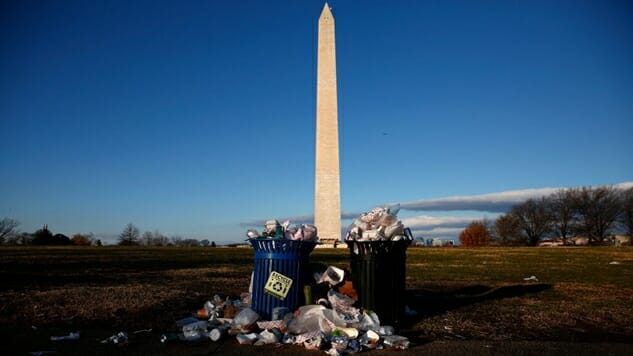It’s Not a Government Shutdown. It Only Hurts the Poor.
Photo by Win McNamee/Getty
Please stop calling it a government shutdown. Banks are still able to get zero interest overnight loans from the Federal Reserve. Lockheed Martin’s checks are still clearing. The government is not closed. Just parts of it.
Essential services like airports, Social Security, Medicare, Medicaid, Amtrak, food inspection, and the postal service are still running, while “nonessential services” like the Environmental Protection Agency, job discrimination complaints, federal research operations and housing voucher requests are shut down.
This is a safety net shutdown. Both the actual essential services like the list above, and “essential services” like Santa Claus tracking (yes, really) are still open. The parts of government which service the wealthy are almost all still working, while those explicitly designed to help those less well-off are some of the first ones to be furloughed. In fact, even some of the essential services designed to help the poor—like food stamps—may run out of funding before other essential services do. While Trump makes the entire future uncertain, given the way Washington D.C. is traditionally run, we can be confident of one fact: Raytheon does not have to worry about losing its essential status like SNAP does.
“shutdowns” are the purist, most public distillation of class warfare we have. One party cravenly starves what little safety net there is while govt that serves the war machine & rich remains unchanged and it’s treated by the media as a “LOL there goes Washington again!” story https://t.co/kQd6RuwSuW
— Adam H. Johnson (@adamjohnsonNYC) January 9, 2019
More from Adam Johnson’s excellent 2017 piece in The Nation where he brought an avalanche of receipts to the same point that I’m getting at:
If the last “shutdown” is any guide, the military, Trump’s luxurious vacations, soft power, our bombing of seven Muslim-majority countries, NSA bulk surveillance, agencies that prop up the oil and gas industry, the CIA’s arming and funding of Syrian rebels, and the FBI’s entrapment regime will remain entirely untouched. The parts of government that serve the poor and working class, however, will be first on the chopping block: libraries, tax collection, national parks, labor and safety regulators, the Commodity Futures Trading Commission (which oversees the derivatives market), environmental regulators, financial regulators, welfare, and WIC [Special Supplemental Nutrition Program for Women, Infants, and Children] will all be axed. Indeed, the one time the government got remotely close to undermining, even briefly, a pillar of the right-wing state, the powers that be arbitrarily decided to leave the Defense Department virtually untouched.
In principle, the criteria of what is and isn’t “essential” is determined by unelected agency and department heads using guidance issued by the Office of Management and Budget based on a Department of Justice opinion authored in 1980 by then-Attorney General Benjamin Civiletti. That determination, according to McClatchy, defines “essential” activities as those that “protect life and property”—a fundamentally reactionary (and curiously unexamined) criterion that elevates property over justice, feeding people, and protecting the vulnerable.
What activities we claim to “protect life” sure do seem to have a narrow view of protecting life. Food and housing falls father down on the “protect life” list than bombing a seemingly endless stream of “terrorists” in foreign countries. It’s almost as if many of these “essential services” also serve traditional D.C. special interests. What a coincidence!
The main job of the United States federal government is to protect the interests of the wealthy and powerful. Corruption is a symbiotic relationship, and America resembled a kleptocracy like Russia long before the words “President Trump” became a reality. Defense contractors, oil companies, insurance companies and Wall Street will never ever have the government shut down for them. No matter what, their interests will be represented because they pay top dollar to make sure they will. The rest of us have to battle over the remaining crumbs at the table.
“Campaign donations” are a fairy tale that Americans tell ourselves about corruption. A “campaign donation” is actually an investment. When Lockheed Martin gives $62,059 to the Republican National Committee and $55,289 to the Democratic Congressional Campaign Committee in the same election cycle, they’re not doing it out of the goodness of their hearts, but to ensure that a bipartisan consensus continues to surround the notion that it is “essential” that the federal government shovel money into their business.
Small dollar donations are indeed donations, but for America’s Real Rulers, they invest in our politicians because they expect a return on that investment, and this safety net shutdown proves that they will continue to get returns on their investment even while the majority of Americans are left out in the cold.
Jacob Weindling is a staff writer for Paste politics. Follow him on Twitter at @Jakeweindling.